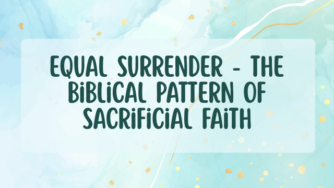Christmas Brings Peace
In the peace of Christmas, beneath the twinkling lights and festive decorations, there exists a profound essence that transcends the mere absence of earthly conflicts. It is not a peace measured by the stillness of battlefields or the silence of wars; rather, it is the gentle whisper of reconciliation weaving through the fabric of human relationships. This ethereal peace, heralded by the arrival of Jesus on earth, marks the inception of a profound transformation in our connection with God.
The imagery of olive trees, hardy and resilient, paints a backdrop to the divine narrative. In ancient times, the act of anointing held great significance, and olive oil was the chosen medium. This sacred oil, derived from the persistent olive tree, symbolized a marking of distinction. Those anointed were set apart, chosen as representatives of God, their outer selves adorned with the tangible manifestation of divine favor.
Delving into the annals of the Old Testament, we encounter figures like King David, whose anointing with olive oil signified a divine calling, a consecration for a higher purpose. It was an outward proclamation of an inward transformation, a visible seal affirming one’s role as a conduit of God’s grace.
The transition from the Old to the New Testament introduces a poignant shift in symbolism during the Last Supper. Jesus, the embodiment of peace, employs the fruit of the vine once again, but with a profound twist. The familiar act of anointing with oil, an external gesture in ancient times, finds a parallel in the internal communion represented by the shared cup of wine.
In the sacred act of communion, believers partake of the symbolic fruit of the vine, the essence of Christ’s sacrifice. Unlike the external anointing of the past, this communion is a call to an inner transformation. It is an invitation to allow the peace that Jesus brings to permeate our very beings, radiating outward from the depths of our souls.
The irony embedded in this ritual is striking – the anointing of the past was from the outside in, but the communion Jesus prescribes is from the inside out. As we sip from the cup, we are reminded that the peace born on that silent night in Bethlehem is not merely an external force, but a catalyst for an internal metamorphosis. It is a peace that starts in the sacred chambers of our hearts, radiating outward to transform our relationships, our communities, and our world.
This Christmas, as we celebrate the birth of Jesus, let us not only revel in the absence of external conflicts but embrace the transformative peace He offers. May this season of eager waiting for Christ but be a profound internal anointing, anointing of the heart, and may this inner peace flow outward, creating ripples of love, compassion, and reconciliation in a world yearning for the enduring tranquility that only Jesus can bring.
Anointing of the heart. This inner anointing is a reminder that the peace we celebrate at Christmas is not merely a cessation of hostilities but a profound, abiding presence that can reshape our very nature. Just as the olive oil of ancient times marked individuals for divine service, the peace of Christ marks us, setting us apart for a higher purpose. It beckons us to live in a way that reflects the love and grace of God, to be bearers of light in a world often shrouded in darkness.
In practical terms, this means letting the peace of Christ influence our daily interactions. Imagine the ripple effect of such peace in our families, workplaces, and communities. When we allow the tranquility of Jesus to govern our responses, we become agents of reconciliation, healing old wounds, and fostering new bonds of understanding and empathy. This peace encourages us to forgive, to extend grace, and to seek unity even in the face of disagreement and discord.
Moreover, the peace of Christ compels us to look beyond our immediate circles and to consider the broader world. It challenges us to be peacemakers on a larger scale, advocating for justice and compassion in our societies. The birth of Jesus is a clarion call to address systemic issues that breed conflict and division, to stand up for the marginalized and oppressed, and to work tirelessly towards a world where peace is not just an ideal but a reality.
As we reflect on the Christmas story, we see that the shepherds and wise men who came to adore the newborn King were changed by their encounter with Him. Their lives were redirected by the divine peace they witnessed. In the same way, our lives can be redirected by the peace we find in Jesus. This redirection might lead us to new acts of service, to mend broken relationships, or to take bold steps in faith that promote peace and goodwill.
Let us also remember that this inner transformation is not a solitary journey. The church, the body of believers, plays a crucial role in nurturing and sustaining this. Through communal worship, prayer, and fellowship, we support one another in our walk of faith. We remind each other of the peace that surpasses understanding and encourage each other to live it out in tangible ways.
In the hustle and bustle of the Christmas season, it is easy to get caught up in the external trappings of the holiday. Yet, let us take time to pause and reflect on the profound peace that Christmas brings. Let us invite that into our hearts, allowing it to transform us from the inside out. As we do so, we will find ourselves not only celebrating the birth of Christ but also living out the true essence of His message
.May this Christmas be a time of deep inner renewal for us all. As we gather with loved ones, exchange gifts, and share meals, let us be ever-mindful of the peace that Jesus offers. Let us strive to embody that in all we do, becoming vessels of His love and grace. In doing so, we honor the true spirit of Christmas and carry forward the message of hope and reconciliation that began in Bethlehem so many years ago.









